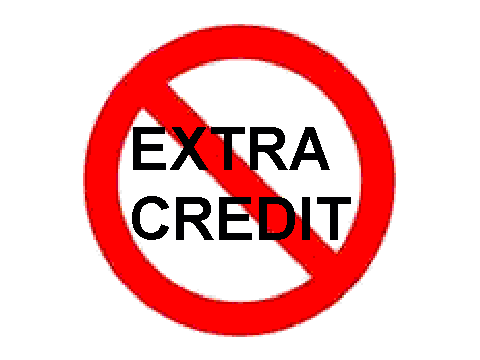[fusion_builder_container hundred_percent=”yes” overflow=”visible”][fusion_builder_row][fusion_builder_column type=”1_1″ background_position=”left top” background_color=”” border_size=”” border_color=”” border_style=”solid” spacing=”yes” background_image=”” background_repeat=”no-repeat” padding=”” margin_top=”0px” margin_bottom=”0px” class=”” id=”” animation_type=”” animation_speed=”0.3″ animation_direction=”left” hide_on_mobile=”no” center_content=”no” min_height=”none”]
“Mr. Miller, is there any extra credit I can do?”
I hear this question at least once a week. At. Least. Once. A. Week. Despite the fact that I spend the entire second day of school going over my grading system – which includes my speech on extra credit – students still pull this question from the depths of their memory to inflate their grades. However, just this past year I eliminated what I call “extra credit assignments” and replaced them with something I call “extra interest assignments.”
Confused? Yeah, so are the kids. But as we near the end of our first marking period, I’ve taken some time to re-explain it to them. I’m a firm believer in my new policy; I hope you consider parts of it for your classroom, and here’s why:
Extra interest assignments are involved and treated like any other project. While some teachers who offer extra credit or “bonus points” simply (and artificially) inflate a student’s grade, by creating extra – and optional – interest assignments, you’re simply asking students to repair a mistake they made. It’s also graded fairly that way, too. So if a student completes an extra interest assignment on local history, they’ll receive a 50/50 score – not a +5 or a +10, as I used to do. I’ve learned to be all about the students working to help correct their grade, not me playing doctor and curing it.
Why? I’m a huge believer in the notion that we’re all built to make mistakes, and we should all have the opportunities to rebound from them. However, the onus for this recovery should be placed firmly on a student’s shoulders, not the teacher’s. Give the students a checklist and explanation sheet (I call it a “Retake Request”) that allows them explain to you, their boss, why they messed up. If their reasoning is sound, I give them another opportunity to make it right.
However, if the student’s explanation on the Retake Request is subpar, their grade remains. Sometimes students just need to learn from their mistakes. Those who fail have the opportunity to do more, but not to either re-do or earn “bonus points.”
This is important to me because I’m not merely trying to build a student who knows all the historical policies, people, and episodes of American history from its beginnings until the Civil War. I’m trying to build a better, more creative thinker. I’m trying to build a more responsible young adult. I’m trying to build an employable American. I’m not trying to build a numerical grade. I’m trying to usher along an education that means something. Extra credit destroys that.
As schools move towards standards-based grading and the Common Core, there’s also no longer any room for extra credit. You either know your concept, skill, or information – or you don’t. There is no second step except to retake the assessment or assignment.
Besides, let’s not forget the truest maxim of extra credit: students who complete extra credit assignments are typically students who don’t need it! Case in point: one student who currently enjoys a 103% in class is the one completing every extra interest assignment. Those who are failing have yet to make a move.
How do students receive grades of 103%, like this young lady has? I still reward students for going above and beyond on assignments, as I think all bosses should. If one makes a great sale or saves the company money at work, they often get a bonus. So when students go the extra mile for me in class, they receive the same – whether on an essay, a Processing Assignment (incredible examples of my students’ PA’s can be seen here) in their Interactive Notebooks, with participation in class, or on a few other things – they earn their “bonus.” That’s it. No extra work for me – just them. I’ve eliminated that excess and extra stress that you might call “extra credit.”
The last thing I want to do as crunch time approaches for the end of the marking period, conferences begin to be scheduled, and there’s only 5 weeks until I get married this year, I have one simple answer for the student’s question:
“Mr. Miller, is there any extra credit I can do?”
Sorry, but no.[/fusion_builder_column][/fusion_builder_row][/fusion_builder_container]




Leave a comment